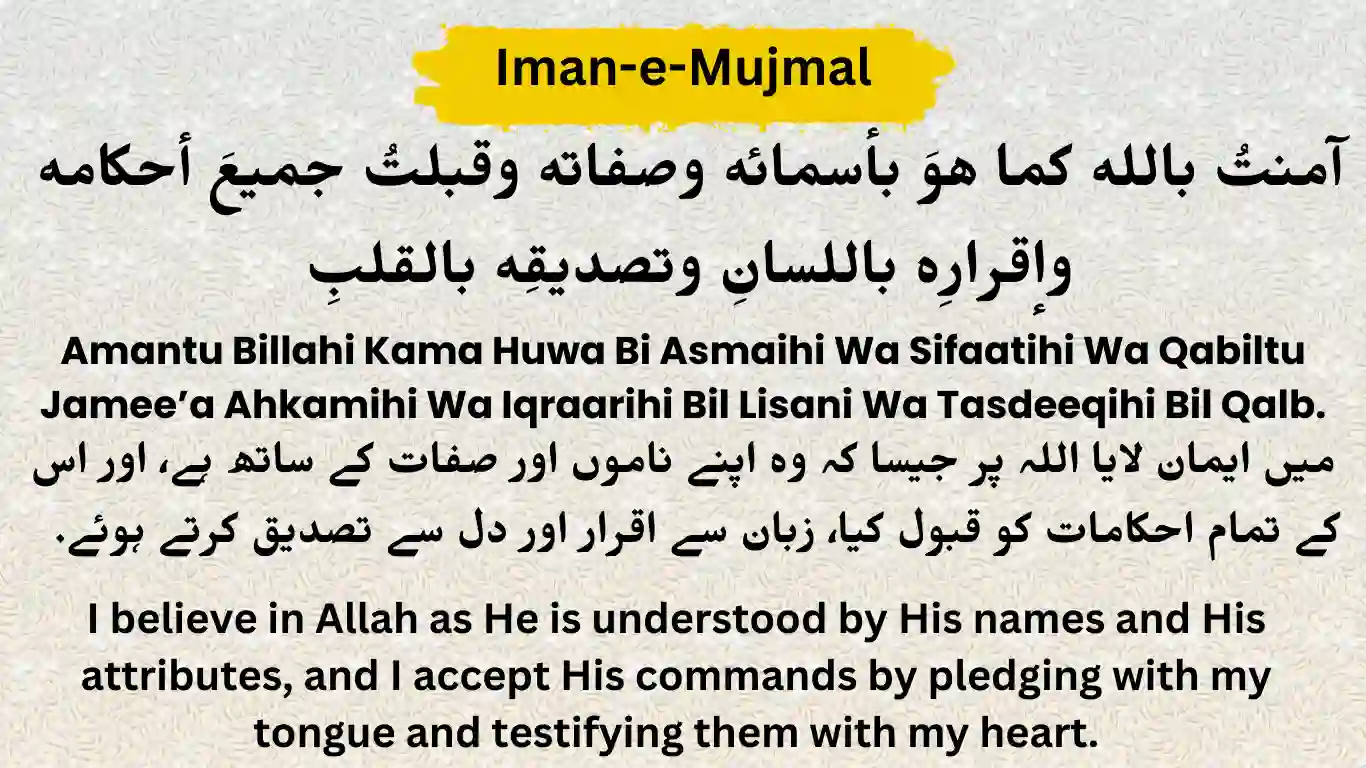Iman-e-Mujmal (Concise Faith) is a fundamental part of a Muslim’s belief system. It is a succinct affirmation of faith that highlights the essence of Islamic creed, emphasizing belief in Allah and His commands. This article provides an in-depth analysis of amantu billahi kama hua, its meaning, significance, and its role in a Muslim’s life.
| Iman e Mufassal- 6 Pillar of Islamic Faith |
| Allahu Nooru Samawati Wal Ard |
| Allahumma Inni Auzubika Minal Hammi Dua |
| What is Salatul Hajat Dua The Prayer of Need? |
What is Iman-e-Mujmal?
Iman-e-Mujmal translates to “Concise Faith.” It is a brief yet powerful declaration of a Muslim’s unwavering belief in Allah and complete submission to His divine attributes and commands.
The full Arabic text :
آمنتُ بالله كما هوَ بأسمائه وصفاته وقبلتُ جميعَ أحكامه وإقرارِه باللسانِ وتصديقِه بالقلبِ
Transliteration:
Amantu Billahi Kama Huwa Bi Asmaihi Wa Sifaatihi Wa Qabiltu Jamee’a Ahkamihi Wa Iqraarihi Bil Lisani Wa Tasdeeqihi Bil Qalb.
Translation in Urdu:
میں ایمان لایا اللہ پر جیسا کہ وہ اپنے ناموں اور صفات کے ساتھ ہے، اور اس کے تمام احکامات کو قبول کیا، زبان سے اقرار اور دل سے تصدیق کرتے ہوئے۔
English Translation:
I believe in Allah as He is understood by His names and His attributes, and I accept His commands by pledging with my tongue and testifying them with my heart.
Breaking Down amantu billahi kama hua
1. Belief in Allah’s Names and Attributes
The phrase “Amantu Billahi Kama Huwa Bi Asmaihi wa Sifaatihi” emphasizes belief in Allah as He has described Himself in the Quran and through His Messenger. It affirms the oneness (Tawheed) of Allah and acceptance of His divine attributes without alteration or interpretation beyond what is revealed.
2. Acceptance of His Commands
The phrase “Wa Qabiltu Jamee’a Ahkamihi” reflects complete submission to Allah’s commands. It signifies that a Muslim accepts all decrees and rulings of Islam as just and beneficial, regardless of personal preferences.
3. Pledging with the Tongue and Heart
The phrase “Wa Iqraarihi Bil Lisani wa Tasdeeqihi Bil Qalb” highlights the dual nature of faith: outward verbal affirmation and inward heartfelt conviction. Both are essential for a true believer in Islam.
Comparison Between Iman-e-Mujmal and Iman-e-Mufassal
While amantu billahi kama hua is a concise declaration of faith, Iman-e-Mufassal provides a detailed explanation of the six articles of faith. Together, they form a comprehensive understanding of a Muslim’s belief system:
- amantu billahi kama hua focuses on the essence of faith.
- Iman-e-Mufassal elaborates on the specific tenets, including belief in Allah, angels, scriptures, messengers, the Last Day, and predestination.
Importance of amantu billahi kama hua in Islam
- Foundation of Belief:
Iman-e-Mujmal is the starting point for every Muslim’s spiritual journey. It encapsulates the core essence of Islam in a few words. - Guidance for Daily Life:
By affirming Allah’s names, attributes, and commands, Iman-e-Mujmal serves as a constant reminder to lead a life aligned with Islamic principles. - Strengthening Faith:
It fosters a deep connection with Allah, blending verbal affirmation and heartfelt devotion.
FAQs
amantu billahi kama hua is a concise statement summarizing a Muslim’s belief in Allah, His attributes, and complete submission to His commands. It reinforces the essence of faith in a brief yet impactful manner.
amantu billahi kama hua is a summary of belief, while Iman-e-Mufassal provides a detailed explanation of the six core beliefs in Islam.
amantu billahi kama hua is easier for children to memorize and understand, making it an ideal starting point for instilling Islamic faith and values in young minds.
Conclusion
amantu billahi kama hua beautifully encapsulates the essence of Islamic faith, emphasizing belief in Allah’s divine attributes and submission to His commands. Its simplicity and depth make it an integral part of a Muslim’s spiritual framework. Reciting and understanding amantu billahi kama hua not only strengthens faith but also inspires a life of piety, sincerity, and devotion to Allah.




